Author Archive
Vaccine Clinic at UTMC Postponed Due to Weather
Monday, February 15th, 2021The COVID-19 vaccine clinic scheduled for Tuesday, Feb. 16, at The University of Toledo Medical Center Outpatient Pharmacy is postponed to Wednesday, Feb. 17, due to the anticipation of significant snowfall.
Individuals who were scheduled to receive a dose of the vaccine during Tuesday’s clinic should report to the UTMC Outpatient Pharmacy on Wednesday at the same time.
UTMC also is working to contact impacted patients directly using the contact information supplied upon registration.
For more information about the University’s vaccine program as one of Ohio’s vaccine providers visit utoledo.edu/coronavirus/vaccine.
UToledo Hosts Dialogue on Diversity to Discuss COVID-19 Vaccines and the Black Community
Tuesday, February 9th, 2021The University of Toledo is continuing its Dialogues on Diversity series with the next virtual town hall in the series titled “COVID-19 Vaccines and the Black Community” taking place 6 p.m. Tuesday, Feb. 16 on Webex.
“There are clear and well-documented historical reasons that Black folks may be apprehensive about vaccines and healthcare in general,” said David Young, director of Toledo Excel and Special Projects at UToledo. “At the same time, COVID-19 has ravaged our communities, and we need to find the most expedient way to eradicate it. Our intent is not to convince or persuade anyone, but rather to provide facts and a transparent dialogue.”
Participants include:
- Dr. Joan Duggan, infectious disease specialist and professor of medicine at UToledo;
- Dr. Kimberly Jenkins, associate dean of diversity and inclusion in the UToledo College of Medicine and Life Sciences;
- Dr. Anthony Pattin, assistant professor of pharmacy practice at UToledo;
- Dr. Rachel Dudley, assistant professor of women’s and gender studies at UToledo;
- Gwendolynn Gregory, director of nursing, clinical and community wellness services at the Toledo-Lucas County Health Department and program director of the Reproductive Health and Wellness Center; and
- Rev. Willie Perryman, president of the Toledo chapter of the NAACP and pastor of Jerusalem Missionary Baptist Church.
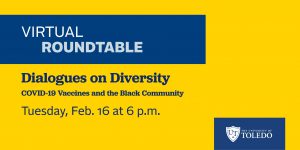 The UToledo Office of Diversity and Inclusion collaborated with Brothers on the Rise, Sister Circle and the UToledo College of Medicine and Life Sciences to organize the event.
The UToledo Office of Diversity and Inclusion collaborated with Brothers on the Rise, Sister Circle and the UToledo College of Medicine and Life Sciences to organize the event.
This is the 11th town hall in the series of recent virtual Dialogues on Diversity since George Floyd was killed in Minneapolis by a police officer, sparking protests against systemic racism across the country.
The University of Toledo is a community that celebrates and respects people of all backgrounds and experiences. As an institution, we remain committed to building an inclusive environment free of racism, sexism, bigotry and other negative influences.
NASA Extends UToledo-led Project Innovating K-12 Science Curriculum
Monday, January 25th, 2021In partnership with NASA and its additional $11.4 million in support, a researcher at The University of Toledo is expanding his work to transform how K-12 science is taught in the U.S. using more hands-on experiments and direct observations to solve environmental problems.
NASA extended for five years the UToledo-led project, which began in 2015 with $10 million in funding.
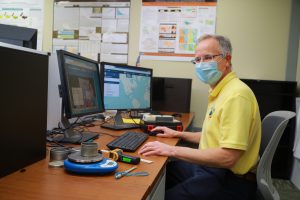
Dr. Kevin Czajkowski, professor of geography and planning
Dr. Kevin Czajkowski, professor of geography and planning in the UToledo College of Arts and Letters, is spearheading the development of new curriculum that relies on helping learners of all ages do real science using the resources of NASA and education partners across the country.
An average of 5,000 students each year participated in the project over the last five years from across the country.
“The main goal of our program is to have students create and do real science projects — authentic science, not something staged in a lab,” Czajkowski said. “Some of the projects students have done are very cutting edge.”
For example, a high school student in Toledo worked with an air quality scientist at NASA Langley Research Center in Virginia to look at how forest fires in California affect the air quality in Ohio.
“Working with a national expert in the area of air quality, the local teenager collected and analyzed data. The team discovered the forest fires made our skies murky, milky white in Toledo, but didn’t affect air quality at the surface,” Czajkowski said.
During the 50th anniversary of the Apollo 11 moon landing in 2019, the program enlisted local middle and high school students in a competition to recreate the historic lunar landing using robots and drones.
Plus, every year students from Ohio and Michigan ranging from kindergartners to college seniors come to UToledo to present research projects related to the Earth’s environment. The most recent conferences have continued virtually during the coronavirus pandemic.
“Being science literate is to be able to ask questions and find out information, gather data and analyze the results,” Czajkowski said. “Our project also is a way to encourage students to pursue STEM degrees.”
UToledo’s project is one of 27 funded with an annual $39 million commitment from NASA’s Science Mission Directorate to implement the next phase of Science Activation — a community-based approach to connect NASA science with students.
“NASA science seeks to serve new communities and expand connections with our premier scientists and engineers. We do that through innovative partnering, and I couldn’t be prouder of the cadre of awardees,” said Thomas Zurbuchen, associate administrator for NASA’s Science Mission Directorate.
The UToledo-led project, called “MISSION EARTH: Fusing GLOBE with NASA Assets to Build Systemic Innovation In STEM Education,” leverages the resources of both NASA and Global Learning and Observations to Benefit the Environment (GLOBE), which is an international science and education program that connects students, teachers, scientists and citizens from different parts of the world to conduct real, hands-on science about their local environment and put it in a global perspective.
UToledo’s partners in the project during the last five years include WestEd, a research and service agency in San Francisco with expertise in high school career readiness; Boston University that has expertise in elementary and college engineering practices; and Tennessee State University which provides its expertise in college service learning. University of California, Berkeley, NASA Langley Research Center and the technology company Science Systems and Applications Inc. (SSAI) at NASA Goddard Space Flight Center also are partners on the project.
The team will expand to include more schools and locations around the U.S. through 2026.
“We’ve already started a Great Lakes campaign, working with Defiance College, Northern Michigan University and State University of New York at Fredonia,” Czajkowski said. “Our idea is to have these new partners duplicate what we’re doing here at UToledo and at Boston University, Tennessee State, West Ed and UC Berkely in California. All of us are creating hubs and then working with other partners in our area. We find that you need a local person to work with the teachers and students.”
UToledo Hosts Dialogue on Diversity Jan. 26
Friday, January 22nd, 2021The University of Toledo is continuing its Dialogues on Diversity series with the next virtual town hall in the series titled “The Path Forward — The Constitution and the Fragility of Democracy” taking place 6 p.m. Tuesday, Jan. 26 on Webex.
“We are quite fortunate to have such distinguished scholars here at the University who are able to help us better understand the constitutional questions and concerns raised by the events of Jan. 6,” said Charlene Gilbert, dean of the UToledo College of Arts and Letters. “Higher education has an important role to play in defending our institutions and our modern democracy. I look forward to hearing the expert insights of our panelists and to an inclusive and informative discussion.”
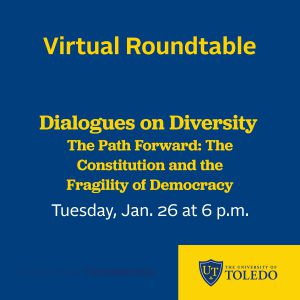 Gilbert will moderate the discussion with participants including:
Gilbert will moderate the discussion with participants including:
- Jeff Newton, UToledo Police chief and director of public safety;
- Dr. Sam Nelson, associate professor and chair of the Department of Political Science and Public Administration;
- D. Benjamin Barros, dean of the College of Law;
- Benjamin Davis, professor of law; and
- Dr. Monita Mungo, assistant professor of sociology.
This is the 10th in a series of recent virtual Dialogues on Diversity since George Floyd was killed in Minneapolis by a police officer, sparking protests against systemic racism across the country.
The University of Toledo is a community that celebrates and respects people of all backgrounds and experiences. As an institution, we remain committed to building an inclusive environment free of racism, sexism, bigotry and other negative influences.
UToledo Lake Erie Center to Outfit Floating Laboratory for Science Cruises
Thursday, January 21st, 2021The University of Toledo Lake Erie Center and its scientists will engage local teachers and hundreds of middle and high school students in hands-on learning on a new floating laboratory on the Maumee River.
The National Oceanic and Atmospheric Administration awarded UToledo a nearly $80,000 grant to fund the STEM educational project titled Maumee River FLOWS —floating laboratory on watershed science.
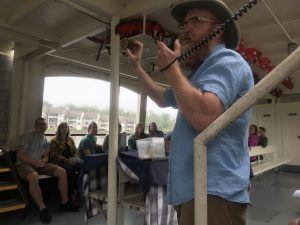
During a “Saturday Morning Science” cruise on the Sandpiper during the summer of 2019, Bridgeman explains to passengers how UToledo monitors the health of Lake Erie and its tributaries.
A central feature of the project is to transform the large Maumee River tour boat, the Sandpiper, into a laboratory for science and art classes by equipping it with sensors, sampling gear and water-testing equipment. Data available from NOAA buoys in nearby Lake Erie and U.S. Geological Survey river gauge stations will allow students to engage with live river and lake data throughout the year.
The funding, which runs through October 2022, also covers the cost of an estimated 30 science cruises aboard the Sandpiper during the 16 months of the project, which can accommodate about 600 students in total.
“Our goal is to foster in teachers and students an awareness and sense of connection with and responsibility for the waters of the Great Lakes,” said Dr. Thomas Bridgeman, professor of ecology and director of the UToledo Lake Erie Center.
“Hundreds of school-age children cross the Maumee River every day, yet have never had the opportunity to venture onto the river or touch the water. Many have never even seen Lake Erie, a mere five miles downstream. We want to get students out on the river, touching the water and becoming aware of its influence on their Great Lake.”
Focused on schools in and near the downtown area along the Maumee River, the project is joined by local partners including Toledo Public Schools, Toledo School for the Arts, Maritime Academy of Toledo, Lucas Soil and Water Conservation District, Partners for Clean Streams and the Sandpiper.
The Lake Erie Center plans to train 10 middle school and high school teachers to use the scientific equipment on board the Sandpiper and provide context to the adventure on the water when the class returns to school.
“The 2014 ‘Toledo Water Crisis’ made everyone in the region aware of the problem of harmful algal blooms, what we call HABs,” Bridgeman said. “Many residents, however, remain unaware of the central role of the Maumee River in gathering agricultural HAB-causing nutrients from the watershed and delivering them to Lake Erie and of the urban effects on the river stemming from storm-water drains, road salt runoff and sewage treatment plant outflows.”
Students will reflect and present their “meaningful watershed educational experience” through science presentations or artistic media.
Students and teachers also will work on stewardship action projects that focus on urban effects on waterways, such as labelling and protecting street storm drains, installing rain barrels and rain gardens, designing alternate parking lot salting schemes, or stream litter removal.
The project is designed to accommodate social distancing and safety procedures required by the COVID-19 pandemic.
“The passenger deck of the Sandpiper is an ideal platform for a socially distanced learning experience,” Bridgeman said. “Designed to carry 100 passengers, the Sandpiper can carry up to 50 passengers with social distancing and an ideal class size of up to 30 students.”
The Lake Erie Center is UToledo’s freshwater research and science education campus focused on finding solutions to water quality issues that face the Great Lakes, including harmful algal blooms, invasive species and pollutants.
Register for UToledo Conference for Aspiring Minority Youth Jan. 30
Tuesday, January 19th, 2021Valerie Jarrett, former senior advisor to the Obama administration, and Sybrina Fulton, mother of Trayvon Martin, will speak at The University of Toledo’s 37th annual Conference for Aspiring Minority Youth.
Advance registration for the free, public conference is required; go to the event website.
This year Toledo Excel, a longtime scholarship incentive program at UToledo, partnered with Owens Corning to offer the free event at 10 a.m. on Saturday, Jan. 30, for seventh- and eighth-graders, high school students and parents. The event is virtual because of the coronavirus pandemic.
“Owens Corning was one of the original corporate supporters for Toledo Excel when we were founded 32 years ago. I could not be happier about us renewing our relationship in 2020,” said David Young, director of Toledo Excel and Special Projects.
“Their generous gift allows us to take an already successful conference to the next level. The quality of speakers and programming we can now offer students and the Toledo community is extremely exciting. We would be excited to have one of them and are greatly blessed to have both.”
Owens Corning donated $50,000 to support the conference.
“Owens Corning is fully committed to joining with our other community stakeholders to accelerate Toledo’s journey to be an inclusive, thriving community of excellence that achieves equity and justice for everyone,” said Leah Maguire, vice president of inclusion and diversity at Owens Corning.
“One of the critical paths on that journey will always be education, investing in our young people and supporting the goals of vital organizations like Toledo Excel.”
Established in 1988, Toledo Excel helps underrepresented students, including African, Asian, Hispanic and Native Americans, achieve success in college. Through summer institutes, academic retreat weekends, campus visits and guidance through the admission process, students increase their self-esteem, cultural awareness and civic involvement.
This year’s speakers have connections to two through lines of 2020: politics and race.

Valerie Jarrett
Jarrett is a senior distinguished fellow at the University of Chicago Law School and a senior advisor to the Obama Foundation. She serves as board chair of When We All Vote and co-chair of The United State of Women. Her New York Times bestselling memoir, “Finding My Voice: When the Perfect Plan Crumbles, the Adventure Begins,” was published last year.
Jarrett served as the chief executive officer of The Habitat Company, chairman and chief executive officer of the Chicago Stock Exchange, chairman of the Chicago Transit Board, deputy chief of staff for Chicago Mayor Richard M. Daley, and practiced corporate, real estate and finance law for 10 years.
“Politics is very much on the mind of this nation with 2020 seeing such hotly contested races,” Young said. “Ms. Jarrett, with her wealth of experience as senior advisor to President Obama for eight years, is a perfect voice in this climate. She also has a passion for strengthening communities.”
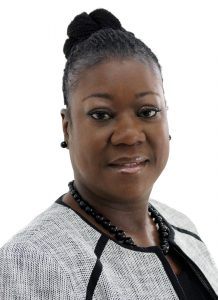
Sybrina Fulton
Fulton has dedicated her life to transforming family tragedy into social change since her 17-year old-son Trayvon Martin was shot by George Zimmerman in 2012. Her book co-authored with Tracy Martin, “Rest in Power: The Enduring Life of Trayvon Martin,” shares the story of her son’s life and the rise of a movement that awoke a nation’s conscience.
Fulton worked for the Miami-Dade County Housing Development Agency for more than 25 years. A Miami native, Fulton graduated from Florida Memorial University, where she earned a bachelor’s degree in English.
“The tragedy Sybrina Fulton faced with the murder of her son Trayvon Martin is unfortunately the reality mothers in our community have faced at an alarming rate,” Young said. “Many of the students who will be in attendance have lost brothers or sisters, cousins, friends and classmates. Ms. Fulton can speak to that pain and, of course, the questions about race and its role in her son’s death and the aftermath.”
National recording artist Isaiah Templeton is recording a special performance of his hit single “Everything Will Be Alright” for the conference.
UToledo Production of ‘20K Leagues Under the Sea’ to Perform in Virtual Festival
Tuesday, January 5th, 2021A play created by The University of Toledo Black Theatre Ensemble and students in the Department of Theatre and Film was selected to be showcased at this year’s annual Kennedy Center American College Theater Festival for Region III.
Titled “20K Leagues Under the Sea” and based on the novel by Jules Verne, it uses the story of Captain Nemo’s fight against injustice and oppression to reflect a contemporary narrative.
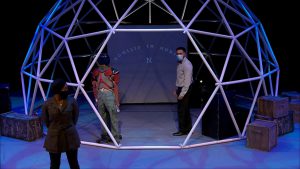
From left, Alexandria Rayford-West as “Captain Nemo” and Carlos Washington as “Professor Aronnax” in the UToledo virtual production of “20K Leagues Under the Sea.”
The play will be available to stream for free after the virtual festival concludes Saturday, Jan. 9. The School of Visual and Performing Arts will post a link to access the performance on its website.
Recorded in September, the production included primarily student writers, a team of student directors and a large ensemble-based cast. The performance was captured by students and faculty from the Department of Communications.
Being accepted into the festival puts the student work and production into consideration for national awards that will be announced in the spring.
In 2019, UToledo’s production of “All Quiet on the Western Front” received the Kennedy Center’s David Mark Cohen Playwrighting Award for outstanding new college play of the year.
The choice of UToledo’s 2020-21 production came about last summer as the UToledo Black Theatre Ensemble and students in the Department of Theatre and Film searched for a project that would address the urgent conversation of social justice, while finding a way to safely and effectively perform during the global health crisis.
Believing the best way to learn theatre is through theatre-making, and knowing time was short and the avenues to do this safely were few, the ensemble set out to build a piece that sought to interrogate systems of oppression and injustice while finding an innovative way to share the story in this unprecedented time.
UToledo College of Law Ranked No. 4 Best Law School for Women by Princeton Review
Wednesday, December 16th, 2020The University of Toledo College of Law is one of the best law schools in the country for women in a prestigious ranking that focuses on student experience and success.
Princeton Review once again selected the UToledo College of Law in its list of the top 164 law schools titled “Best Law Schools 2021.” The college moved up one spot to No. 4 on the national list of the top 10 law schools with the “Greatest Resources for Women.”
Princeton Review identified which law schools offer the greatest resources for women based on the percentage of the student body who identify as women, as well as on student answers to a survey question on whether all students are afforded equal treatment by students and faculty regardless of their gender.
“Women students really excel at Toledo Law, in part because there is safety and comfort in numbers, and women students make up more than 58% of our student body,” said Nicole Buonocore Porter, UToledo law professor, the faculty advisor to the law school’s Women’s Law Student Association and a past winner of UToledo’s Outstanding University Woman Award. “But more importantly, Toledo Law is a great place for women students because of the faculty. All of our faculty members are talented and committed classroom teachers. But our women faculty members are also very compassionate educators. They will go to great lengths to make sure our students feel supported and are getting the most out of their legal education.”
The Best Law Schools rankings are based on data from the company’s surveys of 14,000 students and administrators at 164 law schools.
The Princeton Review’s 80-question student survey asked law school students about their school’s academics, student body and campus life. It also included questions for the respondents about themselves and their career plans. The student surveys were conducted during the 2019-20, 2018-19 and 2017-18 academic years.
The company also selected schools based on an analysis of institutional data collected from surveys of law school administrators during the 2019-20 academic year. The institutional survey covered topics from academic offerings and admission requirements to data about currently enrolled students as well as graduates’ employment.
“We report law school ranking lists in 14 categories—instead of a mega-list, solely based on academics—for one reason: to help applicants identify the law school best for them,” said Rob Franek, editor-in-chief of the Princeton Review. “Our lists name schools that are stand-outs on matters law school applicants have told us are important to them—from career prospects to campus culture distinctions.”
The Princeton Review is a leading tutoring, test prep and college admission services company. Every year, the company helps millions of college- and graduate school-bound students achieve their education and career goals through online and in-person courses delivered by a network of more than 4,000 teachers and tutors, online resources and more than 150 print and digital books published by Penguin Random House.
UToledo Announces Speakers for Conference for Aspiring Minority Youth
Tuesday, December 8th, 2020Valerie Jarrett, former senior advisor to the Obama administration, and Sybrina Fulton, mother of Trayvon Martin, will speak at The University of Toledo’s 37th annual Conference for Aspiring Minority Youth.
This year Toledo Excel, a longtime scholarship incentive program at UToledo, partnered with Owens Corning to offer the free event on Saturday, Jan. 30, for seventh- and eighth-graders, high school students and parents. The event is virtual because of the coronavirus pandemic.
“Owens Corning was one of the original corporate supporters for Toledo Excel when we were founded 32 years ago. I could not be happier about us renewing our relationship in 2020,” said David Young, director of Toledo Excel and Special Projects.
“Their generous gift allows us to take an already successful conference to the next level. The quality of speakers and programming we can now offer students and the Toledo community is extremely exciting. We would be excited to have one of them and are greatly blessed to have both.”
Owens Corning donated $50,000 to support the conference.
“Owens Corning is fully committed to joining with our other community stakeholders to accelerate Toledo’s journey to be an inclusive, thriving community of excellence that achieves equity and justice for everyone,” said Leah Maguire, vice president of inclusion and diversity at Owens Corning.
“One of the critical paths on that journey will always be education, investing in our young people and supporting the goals of vital organizations like Toledo Excel.”
Established in 1988, Toledo Excel helps underrepresented students, including African, Asian, Hispanic and Native Americans, achieve success in college. Through summer institutes, academic retreat weekends, campus visits and guidance through the admission process, students increase their self-esteem, cultural awareness and civic involvement.
This year’s speakers have connections to two through lines of 2020: politics and race.

Valerie Jarrett
Jarrett is a senior distinguished fellow at the University of Chicago Law School and a senior advisor to the Obama Foundation. She serves as board chair of When We All Vote and co-chair of The United State of Women. Her New York Times bestselling memoir, “Finding My Voice: When the Perfect Plan Crumbles, the Adventure Begins,” was published last year.
Jarrett served as the chief executive officer of The Habitat Company, chairman and chief executive officer of the Chicago Stock Exchange, chairman of the Chicago Transit Board, deputy chief of staff for Chicago Mayor Richard M. Daley, and practiced corporate, real estate and finance law for 10 years.
“Politics is very much on the mind of this nation with 2020 seeing such hotly contested races,” Young said. “Ms. Jarrett, with her wealth of experience as senior advisor to President Obama for eight years, is a perfect voice in this climate. She also has a passion for strengthening communities.”

Sybrina Fulton
Fulton has dedicated her life to transforming family tragedy into social change since her 17-year old-son Trayvon Martin was shot by George Zimmerman in 2012. Her book co-authored with Tracy Martin, “Rest in Power: The Enduring Life of Trayvon Martin,” shares the story of her son’s life and the rise of a movement that awoke a nation’s conscience.
Fulton worked for the Miami-Dade County Housing Development Agency for more than 25 years. A Miami native, Fulton graduated from Florida Memorial University, where she earned a bachelor’s degree in English.
“The tragedy Sybrina Fulton faced with the murder of her son Trayvon Martin is unfortunately the reality mothers in our community have faced at an alarming rate,” Young said. “Many of the students who will be in attendance have lost brothers or sisters, cousins, friends and classmates. Ms. Fulton can speak to that pain and, of course, the questions about race and its role in her son’s death and the aftermath.”
Details on how to register for the free, public conference will be released next month.
Moroccan-Born Author to Discuss Why She Calls Her U.S. Citizenship ‘Conditional’
Tuesday, December 1st, 2020Author Laila Lalami, whose new book “Conditional Citizens” traces her path to American citizenship as an Arab Muslim immigrant, will present The University of Toledo’s 20th Annual Maryse and Ramzy Mikhail Memorial Lecture on Tuesday, Dec. 8.
Lalami’s discussion will focus on what it means to belong to a country, with the virtual event scheduled to begin at 7 p.m.
Participants will receive details on how to join the lecture after they register at the event’s website.
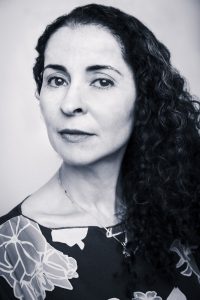
Author Laila Lalami
“As a finalist for the Pulitzer Prize for Fiction, National Book Award for Fiction and the Kirkus Prize, Laila Lalami has proven to be a leading Arab American voice in literature today,” said Tess Waggoner, granddaughter of Maryse and Ramzy Mikhail.
“This lecture series was established 20 years ago by my immigrant Egyptian American grandparents, who were proud to facilitate a space to ask tough questions in the pursuit of knowledge and mutual understanding. We are delighted to be able to continue this tradition virtually with Laila Lalami, the UToledo community and the broader public this year.”
Lalami, who was born in Morocco and came to the United States for graduate school, is the author of four novels, including “The Moor’s Account,” which won the American Book Award, the Arab-American Book Award and the Hurston/Wright Legacy Award and was a finalist for the Pulitzer Prize in Fiction.
Her novel “The Other Americans” was a national bestseller and a finalist for the Kirkus Prize and the National Book Award in Fiction. And her essays and criticism have appeared in the Los Angeles Times, the Washington Post, The Nation, Harper’s, the Guardian and the New York Times.
She also has received fellowships from the British Council, the Fulbright Program and the Guggenheim Foundation.
Lalami lives in Los Angeles and teaches creative writing at the University of California, Riverside.
The free, public lecture has been a continuous event at The University of Toledo since 2001 and is sponsored by the College of Arts and Letters and the Mikhail Endowment Fund.
The Mikhail Lecture Series is sponsored through the Mikhail Endowment Fund, which was originally established through a donation from the Mikhail family to honor the work and contributions of Maryse Mikhail and her involvement in educational, philanthropic and interfaith organizations.
The fund supports an annual lecture dealing with Arab culture, history, politics, economics and other aspects of life in the Middle East, including issues of peace and justice.
More information is available on the event website.
Those who wish to make a tax-deductible contribution to the fund can go to the UToledo Foundation website.

